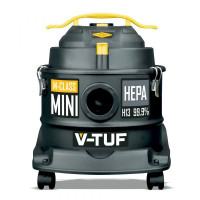Safety is paramount on construction sites and there are strict rules and regulations to follow, including which vacuum cleaner you need to use.
It might not be your first priority when you arrive at site, but you could unknowingly be breaching health and safety regulations, endangering yourself and those around you, as well as costing you a hefty fine if you don’t use a vacuum cleaner fit for the job.
To make sure you don’t run into difficulty with regulations, we’ve put together a short guide and explained the difference between two classes of vacuum cleaners.
Regulations, facts and fines
Using the right class of vacuum cleaner will help prevent harmful dust causing illness to workers. To help you understand which vacuum cleaner you need to use, the Health and Safety Executive (HSE) put together the controlling construction dust with on-tool extraction information sheet.
If you’re thinking that you can use any old vacuum cleaner, think again. A normal vacuum will only extract around 80% of dust and debris, the HSE stated in their regulations that a vacuum cleaner must extract 99.9% of dust. This 99.9% ensures the smaller particles that you and I can’t see are properly extracted.
The risks
Not having the right vacuums on site can cause long term negative effects for site workers.
If you’re breathing in construction dust on a regular basis, over time you can end up with diseases such as asthma, chronic obstructive pulmonary disease, silicosis or even lung cancer.
The figures
To show just how dangerous dust on construction sites can be, the HSE conducted research that showed 8000 people died from cancer caused by inhaling dangerous dust particles. They also found that 39,000 people suffered breathing illnesses that were linked to the dust particles found on construction sites.
You can see why the HSE made vacuum cleaners with 99.9% filtration a requirement on constructions sites.
Can I get fined for not sticking to the rules?
To put it bluntly, yes. The HSE can and will fine employers up to £20,000 if the breach of regulations is found of be severe enough. Some sites have been closed due to severe breaches of the regulations.
The cost of a vacuum cleaner that meets the minimum requirements is a lot less than a potential £20,000 fine.
Types of vacuums
Now you’ve got a better understanding of the regulations, risks and potential fines associated with using the incorrect equipment, we’re going to take a closer at the vacuum cleaners you should be using.
M-class vacuum cleaner
M-class vacuum cleaners offer 99.9% filtration, which meets the minimum requirement set by the HSE. Their filter rate is what makes them suitable for construction sites. They may not have stronger suction power than a household vacuum, but their filter rate ensures a safer working environment for those working on site and adheres to health and safety regulations, covering employers backs too.
The clever science behind m-class vacuum cleaners is that only 1 in 1000 particles are let through, meaning less particles are left in the air after using an M-class vacuum cleaner. If you compare this to a L-class vacuum cleaner, which has a filtration of 90%, 1 in 100 particles are let through. You can see there is a massive difference between using an M-class vacuum cleaner and a household vacuum, making a huge difference to the quality of air workers breathe in.
M-class vacuums are used for hard woods, board materials, concrete and brick dust.
Product example:
H-class vacuum cleaner
H-class vacuum cleaners have the same features as M-class vacuums, but they have higher suction and filtration figures (99.995%). The H-class vacuum has been designed so when the bag is removed from the vacuum, it avoids letting small particles back into the air.
H-class vacuum cleaners are used for highly carcinogenic dusts that can pose more immediate health risks. This includes carcinogens such as, asbestos, formaldehyde, mould, germs and bacteria.
We hope this has helped you understand further what you need to do to meet the HSE requirements for vacuum cleaners on your site.
If you’d like to find out more about the vacuum cleaners we have available, please contact our sales team on 01777 858009 or email sales@kingfisherdirect.co.uk.


